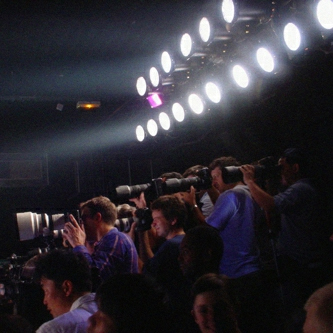There’s a hypothetical nightclub that, at present, exists solely in my imagination: it’s a hybrid combination of the Star Wars bar, the Korova in A Clockwork Orange, and that weirdo Canadian clubhouse from Fire Walk With Me. In it, the barkeeps might serve burbling broths of kombucha and gin, or ayahuasca in a hollowed-out pineapple, shaded by cocktail umbrellas, perhaps with some sort of delectable psychotropic hors d’oeuvres on the side. It would be a place where earthly and celestial creatures of all shapes, sizes, colours, and cultures could commingle and work out their differences in a relaxed, comfortable environment. And if I were the proprietor of such an establishment, I’d do my utmost to book the Moritz Von Oswald Trio as the house band; Fetch, their latest record for Honest Jon’s, represents the sort of sonic aesthetic that this chimerical cabaret would warrant.
Consisting of four longform compositions that gracefully entwine elements of dub, techno, and jazz, Fetch is an accomplishment in this type of concoctive postulating. Whilst those foundational components provide the underlying structure for the works, there is an emphasis on the improvisatory and contingent evident throughout. Fetch’s live, dialogic qualities stem from spry recording sessions with main players Von Oswald, Sasu Ripatti, and Max Loderbauer, supported by bassist Marc Muellbauer, and the effects wizardry of Tobias Freund.
The album’s opener, aptly entitled ‘Jam’, is a proper meanderer, which features Sebastian Studnitzky on trumpet conjuring a theoretical outtake from Bitches Brew. Unfolding over 17 and a half minutes, acoustic percussive instrumentation and strategic stabs of bouncing, delayed bass punctuate the piece’s sauntering backbeat. Vaguely reminiscent of Barry Adamson’s contributions to the Lost Highway soundtrack, ‘Dark’, the successive cut, drops the pace back further still, nodding and lurching hypnotically beneath cool and steely horn melodies, and expert knob-twiddling textures. The second half of the recording reflects the Trio’s return to more dancefloor-aware fare: ‘Club’ is steeped in Von Oswald’s Basic Channel brand of minimal techno, while ‘Yangissa’ ventures skillfully into Aka Pygmy rhythmic territories.
Part of the album’s cunning is owed to the time allotted for disparate strands to develop and take form. Although there may be moments that feel as though the Trio could be flailing off uncontrollably, they seem to resolve themselves through an amenable musical dialectic. The ostensibly incongruent ideas and genres present in Fetch could have easily fallen apart in less adroit hands, yet there is an air of articulate conversation and commentary to these four improvisations – an experienced group of musicians speaking and listening to one another through their instruments. In a 2009 editorial for the journal Critical Studies in Improvisation, scholar Daniel Fischlin argues that this manner of artistic spontaneity is “a necessary, primal cultural practice of encounter, a profoundly creative aspect of being human in a community.” And while the imaginary nightclub in my mind might be the ideal imagined space for such encounters to take place, Fetch is fitting listening for them in the real world.


